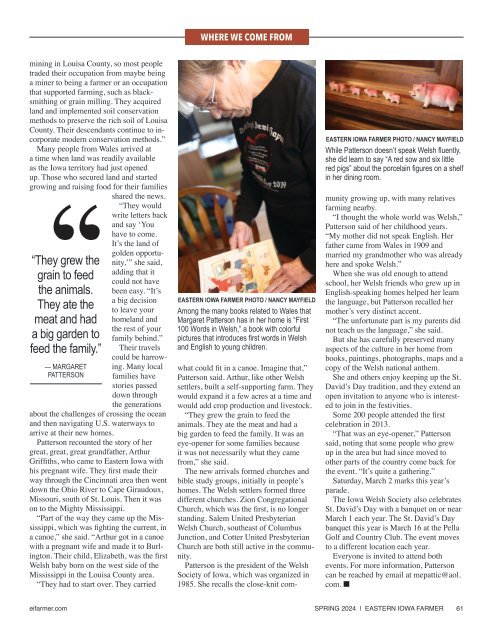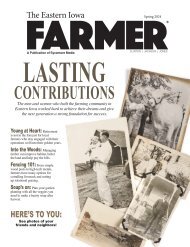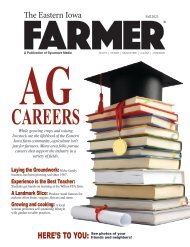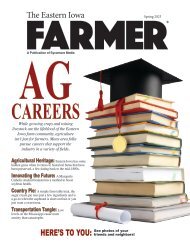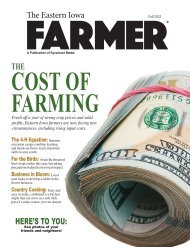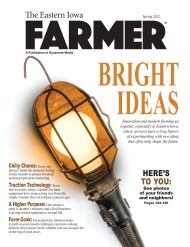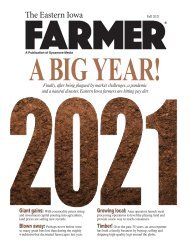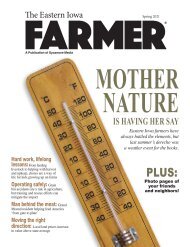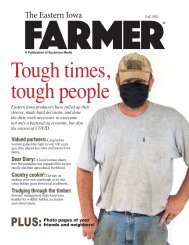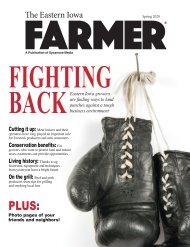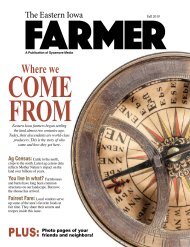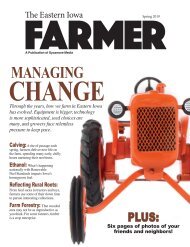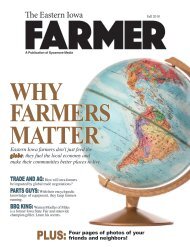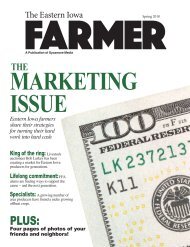Create successful ePaper yourself
Turn your PDF publications into a flip-book with our unique Google optimized e-Paper software.
WHERE WE COME FROM<br />
mining in Louisa County, so most people<br />
traded their occupation from maybe being<br />
a miner to being a farmer or an occupation<br />
that supported farming, such as blacksmithing<br />
or grain milling. They acquired<br />
land and implemented soil conservation<br />
methods to preserve the rich soil of Louisa<br />
County. Their descendants continue to incorporate<br />
modern conservation methods.”<br />
Many people from Wales arrived at<br />
a time when land was readily available<br />
as the Iowa territory had just opened<br />
up. Those who secured land and started<br />
growing and raising food for their families<br />
shared the news.<br />
“They would<br />
write letters back<br />
and say ‘You<br />
have to come.<br />
It’s the land of<br />
“They grew the<br />
grain to feed<br />
the animals.<br />
They ate the<br />
meat and had<br />
a big garden to<br />
feed the family.”<br />
— MARGARET<br />
PATTERSON<br />
golden opportunity,’”<br />
she said,<br />
adding that it<br />
could not have<br />
been easy. “It’s<br />
a big decision<br />
to leave your<br />
homeland and<br />
the rest of your<br />
family behind.”<br />
Their travels<br />
could be harrowing.<br />
Many local<br />
families have<br />
stories passed<br />
down through<br />
the generations<br />
about the challenges of crossing the ocean<br />
and then navigating U.S. waterways to<br />
arrive at their new homes.<br />
Patterson recounted the story of her<br />
great, great, great grandfather, Arthur<br />
Griffiths, who came to Eastern Iowa with<br />
his pregnant wife. They first made their<br />
way through the Cincinnati area then went<br />
down the Ohio River to Cape Giraudoux,<br />
Missouri, south of St. Louis. Then it was<br />
on to the Mighty Mississippi.<br />
“Part of the way they came up the Mississippi,<br />
which was fighting the current, in<br />
a canoe,” she said. “Arthur got in a canoe<br />
with a pregnant wife and made it to Burlington.<br />
Their child, Elizabeth, was the first<br />
<strong>We</strong>lsh baby born on the west side of the<br />
Mississippi in the Louisa County area.<br />
“They had to start over. They carried<br />
EASTERN IOWA FARMER PHOTO / NANCY MAYFIELD<br />
Among the many books related to Wales that<br />
Margaret Patterson has in her home is “First<br />
100 Words in <strong>We</strong>lsh,” a book with colorful<br />
pictures that introduces first words in <strong>We</strong>lsh<br />
and English to young children.<br />
EASTERN IOWA FARMER PHOTO / NANCY MAYFIELD<br />
While Patterson doesn’t speak <strong>We</strong>lsh fluently,<br />
she did learn to say “A red sow and six little<br />
red pigs” about the porcelain figures on a shelf<br />
in her dining room.<br />
what could fit in a canoe. Imagine that,”<br />
Patterson said. Arthur, like other <strong>We</strong>lsh<br />
settlers, built a self-supporting farm. They<br />
would expand it a few acres at a time and<br />
would add crop production and livestock.<br />
“They grew the grain to feed the<br />
animals. They ate the meat and had a<br />
big garden to feed the family. It was an<br />
eye-opener for some families because<br />
it was not necessarily what they came<br />
from,” she said.<br />
The new arrivals formed churches and<br />
bible study groups, initially in people’s<br />
homes. The <strong>We</strong>lsh settlers formed three<br />
different churches. Zion Congregational<br />
Church, which was the first, is no longer<br />
standing. Salem United Presbyterian<br />
<strong>We</strong>lsh Church, southeast of Columbus<br />
Junction, and Cotter United Presbyterian<br />
Church are both still active in the community.<br />
Patterson is the president of the <strong>We</strong>lsh<br />
Society of Iowa, which was organized in<br />
1985. She recalls the close-knit community<br />
growing up, with many relatives<br />
farming nearby.<br />
“I thought the whole world was <strong>We</strong>lsh,”<br />
Patterson said of her childhood years.<br />
“My mother did not speak English. Her<br />
father came from Wales in 1909 and<br />
married my grandmother who was already<br />
here and spoke <strong>We</strong>lsh.”<br />
When she was old enough to attend<br />
school, her <strong>We</strong>lsh friends who grew up in<br />
English-speaking homes helped her learn<br />
the language, but Patterson recalled her<br />
mother’s very distinct accent.<br />
“The unfortunate part is my parents did<br />
not teach us the language,” she said.<br />
But she has carefully preserved many<br />
aspects of the culture in her home from<br />
books, paintings, photographs, maps and a<br />
copy of the <strong>We</strong>lsh national anthem.<br />
She and others enjoy keeping up the St.<br />
David’s Day tradition, and they extend an<br />
open invitation to anyone who is interested<br />
to join in the festivities.<br />
Some 200 people attended the first<br />
celebration in 2013.<br />
“That was an eye-opener,” Patterson<br />
said, noting that some people who grew<br />
up in the area but had since moved to<br />
other parts of the country come back for<br />
the event. “It’s quite a gathering.”<br />
Saturday, March 2 marks this year’s<br />
parade.<br />
The Iowa <strong>We</strong>lsh Society also celebrates<br />
St. David’s Day with a banquet on or near<br />
March 1 each year. The St. David’s Day<br />
banquet this year is March 16 at the Pella<br />
Golf and Country Club. The event moves<br />
to a different location each year.<br />
Everyone is invited to attend both<br />
events. For more information, Patterson<br />
can be reached by email at mepattic@aol.<br />
com. n<br />
eifarmer.com SPRING 2024 | EASTERN IOWA FARMER 61


